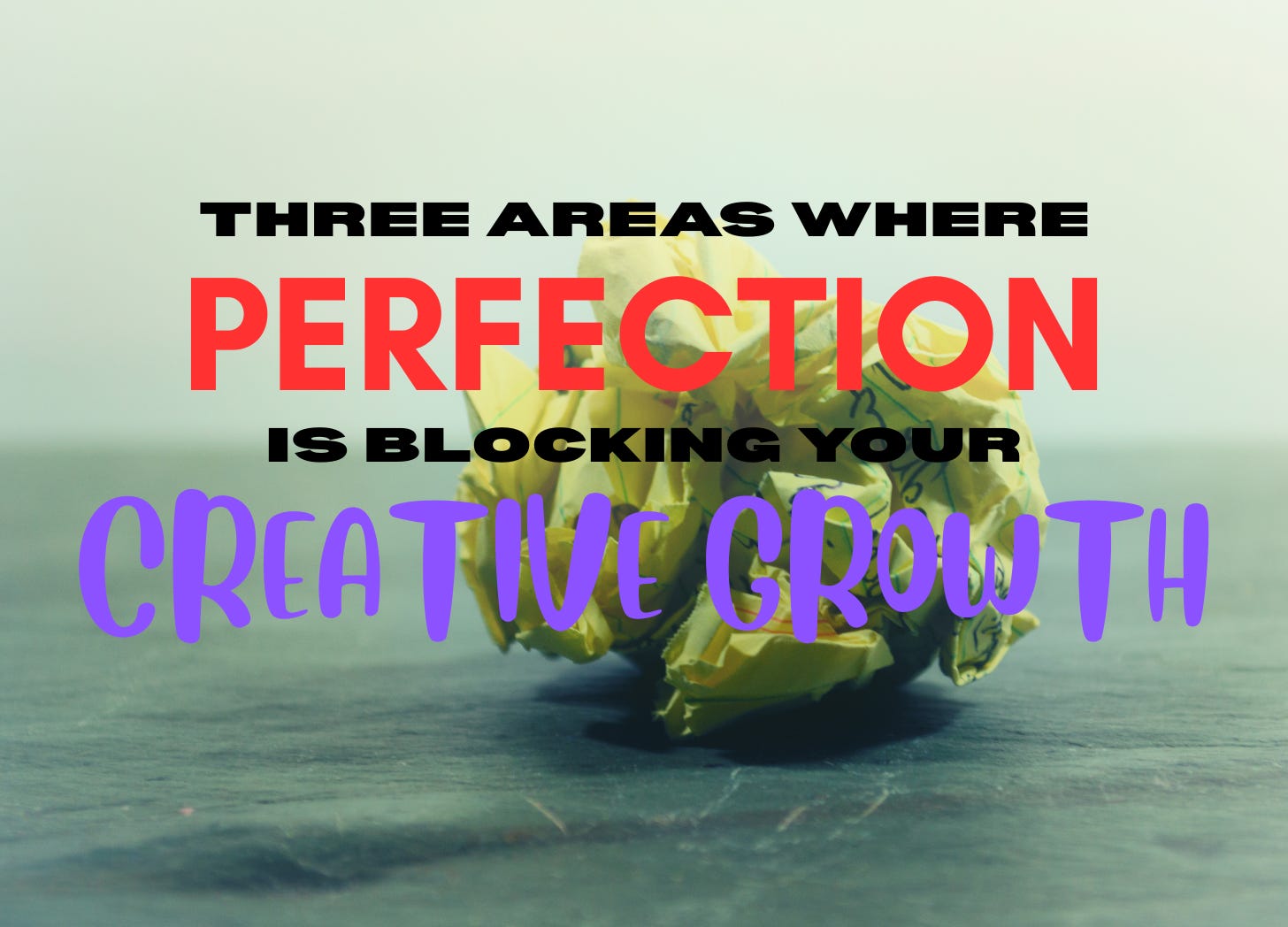Three Areas Where Perfection Is Blocking Your Creative Growth
Giving Yourself Permission to Produce Less Than Perfect Work
Students around the globe are experiencing a great injustice today.
A massacre of red ink is being poured onto first drafts, killing the creative spirit in which their papers were written. Perfectionists are being born in this origin story, mortified that their “not-to-be-graded” drafts have returned bleeding with corrections.
We’ve all experienced this in school: a teacher assigns a paper and promises the first draft won’t be graded. In an effort to be helpful, they mark it up with corrections and suggestions. Unfortunately, this sends the wrong message about first drafts. Instead of encouraging students to get their ideas down freely, it shifts the focus to polished perfection right from the start.
Today, in Part 2 of my series on giving yourself permission, we’re exploring how to give yourself permission to produce less than perfect work. There are three key areas where perfectionism holds us back from reaching our creative potential. Let’s examine them and figure out how to permit imperfection.
1. Your first draft is allowed to be awful
Your first drafts are supposed to be messy, barely coherent brain dumps. The goal isn’t perfection, it’s getting your ideas out. A first draft’s job is to turn a blank slate into something you can build on. Worrying about getting everything just right from the start is a fast track to writer’s block. Get your ideas out; you can refine them later.
Rules for first drafts don’t exist.
No one needs to see your first draft. There are no First Draft Police enforcing imaginary standards. In fact, the only time people care about a first draft is after you’ve become wildly successful, when they’re curious about how it all started.
Focus on getting your thoughts out of your head and onto the page. The only person your first draft needs to make sense to is you. You have permission to write a terrible first draft.
Treat assignments like second drafts.
In the real world, no one grades your first draft. If you’re a student, here’s my advice: treat any “first draft” assignment as a second draft. Write your real first draft, revise it, and then turn it in. Remember, your teachers mean well. They're trying to help you become a better communicator, artist, or writer.
2. Your experiments may not work
As creators, we need to be experimenting all the time. Trying new things builds our skills and teaches us what works, and what doesn’t.
Sometimes, that means producing things that fail. Often, it takes failure after failure to figure out what works. This means creating many things that are far from perfect.
Give yourself permission to try things even if you’re unsure they’ll work. Better yet, get excited about trying things you suspect might flop. Don’t tiptoe onto the dance floor with your idea. Bust out your moves with confidence. If the idea fails, at least it won’t be from lack of commitment.
Write in a different voice. Paint with a new medium. Sing a different style. Give yourself permission to experiment boldly. It’s the best way to grow in your craft.
3. Publish less than perfect work
Permission to create imperfect work doesn’t stop at the first draft. No matter how much effort you put into polishing something, there will always be flaws. Just ask J.R.R. Tolkien, who spent nearly two decades writing The Lord of the Rings, and still included a foreword listing all the things he thought he got wrong (his main complaint: it was too short!).
We need practice publishing our work, just like we need practice creating it. Sharing your work with an audience is a skill, and the only way to improve it is by doing it.
Publishing creates a feedback loop. As people engage with your work, you learn:
Do readers understand what you’re trying to say?
Do your titles catch attention?
Are people connecting with your ideas?
You have to play the game.
One area I’ve spent a lot of time in is chess. To get good, you have to study tactics, openings, endgames, and strategy. But my biggest mistake was spending too much time studying, and not enough time playing. When I finally did play, the games quickly went off-script. My studies didn’t help because they weren’t grounded in real experience.
Worse, I developed performance anxiety. If I had played and lost hundreds of games early on, I would’ve improved faster and gotten over the anxiety.
It’s the same with creative work. You can read endlessly about your craft. You can draft for days. But real growth only comes after you share your work with others.
I’m not saying don’t aim for high-quality work. What I am saying is: don’t get so caught up in perfection that you never publish. Share your work. Make mistakes. They won’t be as big or as bad as you think.
Give yourself permission to publish less than perfect work.
Let me know in the comments:
Where are you going to give yourself permission to be less than perfect this week?
Next Week
We continue the series on giving yourself permission with a look at publishing. Specifically, how to share your work without waiting for a publisher, gallery, or anyone else with “authority” to give you the green light.



